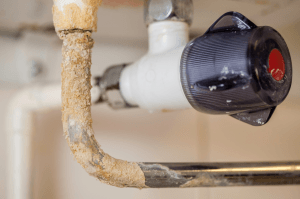Calcium buildup, often referred to as “hard water deposits” or “lime scale,” can wreak havoc on your plumbing system. These stubborn deposits can reduce water flow, compromise the efficiency of your water heaters, and even damage your fixtures. At R.S. Andrews, we understand the importance of maintaining a clean and efficient plumbing system. In this article, we’ll guide you through how to clean plumbing fixtures and protect your plumbing from hard water.
1. Soften Your Water with a Reliable System
Water softeners are the first line of defense against calcium buildup. Hard water, rich in minerals like calcium and magnesium, leaves residue behind. This is what we see as those notorious white spots on glass and buildup around fixtures. To prevent this, it’s essential to invest in a reliable water softening system.
These devices, through a process called ion exchange, swap out these hard ions with softer ones, typically sodium or potassium ions. Not only does this protect your plumbing from harmful mineral buildup, but it also improves the overall feel of the water. With softened water, detergents dissolve better, making cleaning more efficient, and you might even notice that your skin and hair feel softer and less dry after a shower.
2. Clean Your Plumbing Fixtures Regularly
Over time, even with preventive measures, there might be some minor calcium deposits on plumbing fixtures. These can be a bane, reducing the aesthetic appeal of your fixtures and making them less effective. Regular maintenance, such as cleaning and descaling, ensures that these deposits are promptly removed.
If you’re wondering how to clean plumbing fixtures to keep them sparkling, a good starting point is a homemade solution of white vinegar and water. Soaking your fixtures in this mixture can help dissolve calcium deposits, leaving them looking brand new. Moreover, regular cleaning prevents minor deposits from accumulating into bigger, harder-to-remove blockages.
3. Adjust Your Water Heater’s Temperature
It’s a lesser-known fact that hot water encourages calcium precipitation, leading to faster accumulation in your heaters and pipes. Most homeowners set their water heaters at higher temperatures either for those scalding hot showers or thinking it’ll cleanse better.
However, keeping the temperature at 120°F or below not only reduces calcium buildup but also decreases the risk of accidental burns. Additionally, a cooler setting means less energy used, translating to savings on your utility bills.
4. Regulate Water Pressure for Durable Plumbing
Just as high blood pressure isn’t good for humans, high water pressure isn’t ideal for your plumbing. Elevated pressures can wear out fixtures faster and push calcium and other minerals to deposit more quickly within your plumbing system.
By installing a pressure-reducing valve, you regulate the force with which water flows through your pipes. This helps maintain your plumbing’s health and increases its lifespan. Moreover, consistent water pressure ensures a comfortable experience, whether you’re taking a shower or simply washing your hands.
5. Explore Water Softener and Water Treatment System Services
In the quest to combat calcium buildup, considering professional water softener and water treatment system services can be invaluable. These specialized services go beyond the standard water softening methods, offering comprehensive solutions tailored to your home’s unique needs. With the guidance of experts, you’ll be introduced to advanced systems that not only prevent calcium deposits but also ensure the overall quality of your water is pristine.
At R.S. Andrews, we pride ourselves on offering top-tier Water Softener and Water Treatment System services. Our team of experts can assess your home’s needs, recommend the right systems, and ensure proper installation. With our services, you’re not just buying a product, but a long-term solution paired with our ongoing support.
Frequently Asked Questions
What are the signs of calcium buildup in my plumbing?
Signs include reduced water flow, white or cloudy stains on fixtures, and in advanced cases, reduced appliance efficiency. If faucets or showerheads have reduced water pressure, it might be due to calcium deposits.
How often should I schedule professional maintenance to prevent calcium buildup?
Ideally, you should have your plumbing system checked annually. Depending on the hardness of your water and the solutions in place, professionals might recommend a different frequency.
Are there any health risks associated with drinking hard water?
Generally, hard water isn’t considered harmful to health. In fact, the minerals it contains, like calcium and magnesium, are beneficial in small amounts. However, excessively hard water can lead to other issues like dry skin and hair.
How do I know if I need a water softener or a water treatment system?
If you’re noticing consistent signs of calcium buildup, or if a water test indicates high mineral content, it’s likely you’ll benefit from a water softener. A complete water treatment system might be ideal for homes with multiple water quality issues, not limited to hardness. R.S. Andrews can help evaluate your specific needs and recommend the most suitable solution.
Will installing a water softener affect my water bill?
While water softeners do use extra water for the regeneration process, the increase in the water bill is typically minimal. However, in the long run, by protecting your plumbing and appliances from calcium buildup, a water softener can save you money on potential repairs and replacements.


